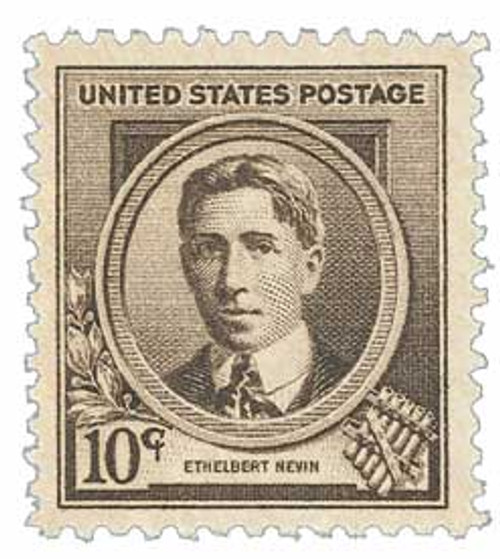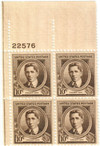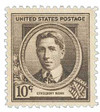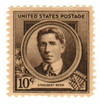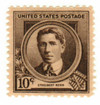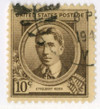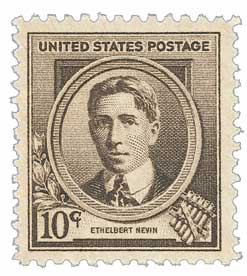
# 883 - 1940 Famous Americans: 10c Ethelbert Nevin
1940 10¢ Ethelbert Nevin
Famous Americans Series: Composers
First City: Pittsburgh, Pennsylvania
Quantity Issued: 13,328,000
Printed by: Bureau of Engraving and Printing
Printing Method: Rotary Press
Perforation: 10 ½ x 11
Color: Dark brown
Birth Of Ethelbert Nevin
Nevin received most of his education from his father, who edited a Pittsburgh newspaper, and contributed articles to magazines. He even composed songs, including a number of campaign songs such as “Our Nominee†for James K. Polk. Nevin’s mother played piano – her grand piano was the first to be taken across the Allegheny Mountains.
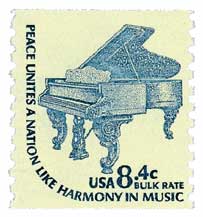
Nevin showed a joy and talent for music from a young age. He began playing the piano at age four and his father paid for him to have singing and instrument lessons. Nevin’s father even took him to Europe to study music for two years. He went on to attend the University of Pittsburgh for a year.
Nevin spent two years in Boston studying piano with Benjamin Johnson Lang. He returned home to Pittsburgh and spent some time teaching piano himself until he saved enough money to go to Berlin. He spent three years there working with Karl Klindworth, who he said he owed his musical success to. Nevin said that, “He used to insist that a man does not become a musician by practicing so many hours a day at the piano, but by absorbing an influence from all the arts and all the interests of life, from architecture, painting, and even politics.â€

In 1885, Nevin was one of four of Kindworth’s students selected by Hans von Bülow for an exclusive artist class. They performed in a special recital attended by a number of notable European celebrities. Nevin then returned to the US in 1887, settling in Boston where he taught and occasionally played concerts.Â

Nevin went to Paris in 1892 and taught American and French singers for operatic performances. He moved to Berlin 1893 and threw himself into composing. He worked so hard his health suffered and he had to spend a year recuperating. Nevin went on to spend time in Florence and Venice before returning the US, where he died on February 17, 1901.Â

Nevin was a prominent composer throughout his life. His former teacher, Klindworth said he had “a touch that brings tears.â€Â Some of his most notable works include the piano piece Narcissus from Water Scenes and the songs “The Rosary†and “Mighty Lak’ a Rose.â€Â He was inducted into the Songwriters Hall of Fame in 1970.

Click here to hear some of Nevin’s music.
Â
1940 10¢ Ethelbert Nevin
Famous Americans Series: Composers
First City: Pittsburgh, Pennsylvania
Quantity Issued: 13,328,000
Printed by: Bureau of Engraving and Printing
Printing Method: Rotary Press
Perforation: 10 ½ x 11
Color: Dark brown
Birth Of Ethelbert Nevin
Nevin received most of his education from his father, who edited a Pittsburgh newspaper, and contributed articles to magazines. He even composed songs, including a number of campaign songs such as “Our Nominee†for James K. Polk. Nevin’s mother played piano – her grand piano was the first to be taken across the Allegheny Mountains.

Nevin showed a joy and talent for music from a young age. He began playing the piano at age four and his father paid for him to have singing and instrument lessons. Nevin’s father even took him to Europe to study music for two years. He went on to attend the University of Pittsburgh for a year.
Nevin spent two years in Boston studying piano with Benjamin Johnson Lang. He returned home to Pittsburgh and spent some time teaching piano himself until he saved enough money to go to Berlin. He spent three years there working with Karl Klindworth, who he said he owed his musical success to. Nevin said that, “He used to insist that a man does not become a musician by practicing so many hours a day at the piano, but by absorbing an influence from all the arts and all the interests of life, from architecture, painting, and even politics.â€

In 1885, Nevin was one of four of Kindworth’s students selected by Hans von Bülow for an exclusive artist class. They performed in a special recital attended by a number of notable European celebrities. Nevin then returned to the US in 1887, settling in Boston where he taught and occasionally played concerts.Â

Nevin went to Paris in 1892 and taught American and French singers for operatic performances. He moved to Berlin 1893 and threw himself into composing. He worked so hard his health suffered and he had to spend a year recuperating. Nevin went on to spend time in Florence and Venice before returning the US, where he died on February 17, 1901.Â

Nevin was a prominent composer throughout his life. His former teacher, Klindworth said he had “a touch that brings tears.â€Â Some of his most notable works include the piano piece Narcissus from Water Scenes and the songs “The Rosary†and “Mighty Lak’ a Rose.â€Â He was inducted into the Songwriters Hall of Fame in 1970.

Click here to hear some of Nevin’s music.
Â

